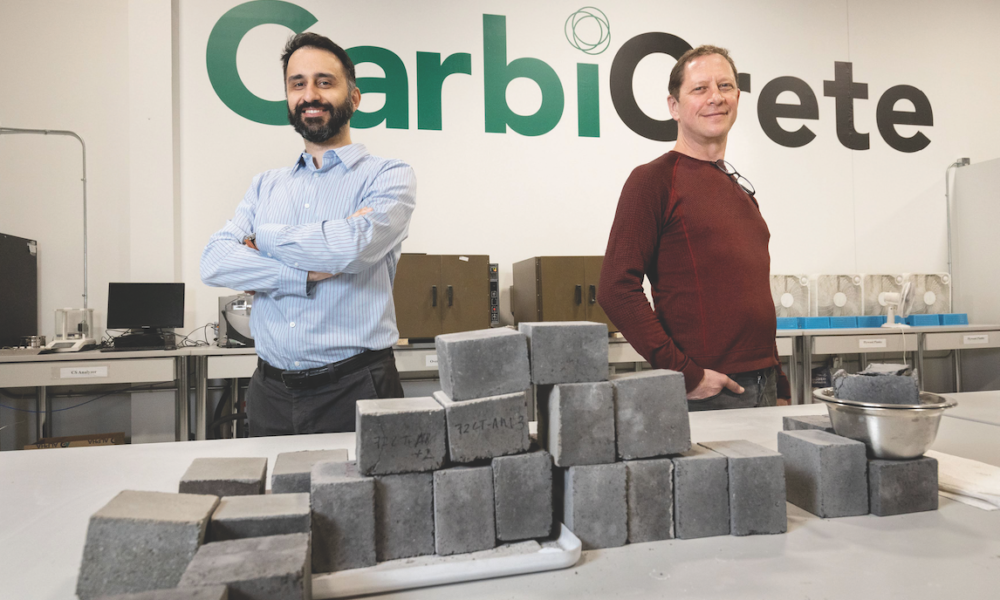After water, concrete is the most commonly used resource in the world. From the buildings we live in to the roads we drive on, nearly everything in our built environment is made from concrete. Unfortunately, it’s also the most destructive material in the world, responsible for approximately eight per cent of global carbon emissions. But, what if there was a way for us to construct our world without killing it?
CarbiCrete, a start-up co-founded by McGill alumnus Dr. Mehrdad Mahoutian, PhD ‘14, and Chris Stern, BEng ‘94, has figured out a way to produce the world’s first commercially available, carbon-negative concrete. CarbiCrete’s concrete is made from steel slag, a waste material from the steel production process, and CO2 gas sourced from industrial vents. This means that their concrete takes more CO2 out of the atmosphere than it emits.
Mahoutian first developed the techniques used by CarbiCrete as a PhD student at McGill. During his studies, Mahoutian’s doctoral supervisor was toying with the idea of creating concrete using CO2, so Mahoutian built on this idea in his own research. He addressed the question of how to make concrete without cement, while also trapping CO2. After years of trial and error, Mahoutian and his team created a successful prototype.
Mahoutian’s process reduces greenhouse gases in two ways. First, steel slag is mixed with conventional minerals using typical concrete manufacturing machinery. In this first step, cement is not required, so CarbiCrete eliminates the environmentally destructive process of creating cement from its production line. Next, the mixture is poured into molds and cured for 24 hours in an absorption chamber. CO2 captured from industrial byproducts is then injected into the chamber where it reacts with the mixture, becoming calcium carbonate. The CO2 becomes trapped in the calcium carbonate and never makes it to the atmosphere.
McGill assisted Mahoutian and his team throughout the patent application process. Mark Weber, McGill’s Director of Innovation and Partnerships, connected Mahoutian with Chris Stern, a seasoned executive who had spent a large part of his career working with renewable energy companies.
“I knew the technology […] but [I did not have] lots of knowledge about how business works,” said Mahoutian in an interview with the The McGill Tribune. “On the other hand, [Stern] didn’t know anything about concrete or cement, but he was perfect and very experienced in business development.”
Working together, the two formally incorporated CarbiCrete in 2016.
Rather than sell physical blocks of concrete, the CarbiCrete team licenses out its technology to concrete manufacturers. In addition to providing environmental benefits, CarbiCrete’s concrete blocks also allow companies to save money on carbon taxes, access the green materials market, and reduce costs of warehousing—CarbiCrete’s curing process only takes 24 hours as opposed to the 28 days required for common cement blocks.
“Concrete is the largest contributor to embodied carbon in the built environment,” said Yuri Mytko, CarbiCrete’s chief marketing officer, in an interview with the Tribune. “This presents a massive opportunity to permanently remove large amounts of CO2 [from the atmosphere].”
In May 2022, CarbiCrete secured $23.5 million in Series A, or early stage, funding from mostly Canadian investors. This new cash flow, combined with the recent launch of a pilot manufacturing project, leaves the company well-positioned to begin commercial sales and expand access to its technology. On Sept. 19, CarbiCrete announced that Gary Belisle, former CEO of the Canadian concrete giant Permacon, will step in as its chief of operations.
CarbiCrete’s success is one of many examples of how science and creativity can work in tandem to solve the world’s most pressing problems—in this case, the climate crisis. And it all started at McGill.










Pingback: Os primeiros blocos de concreto de “carbono negativo” do mundo estão prontos para uso comercial - O guia da engenharia